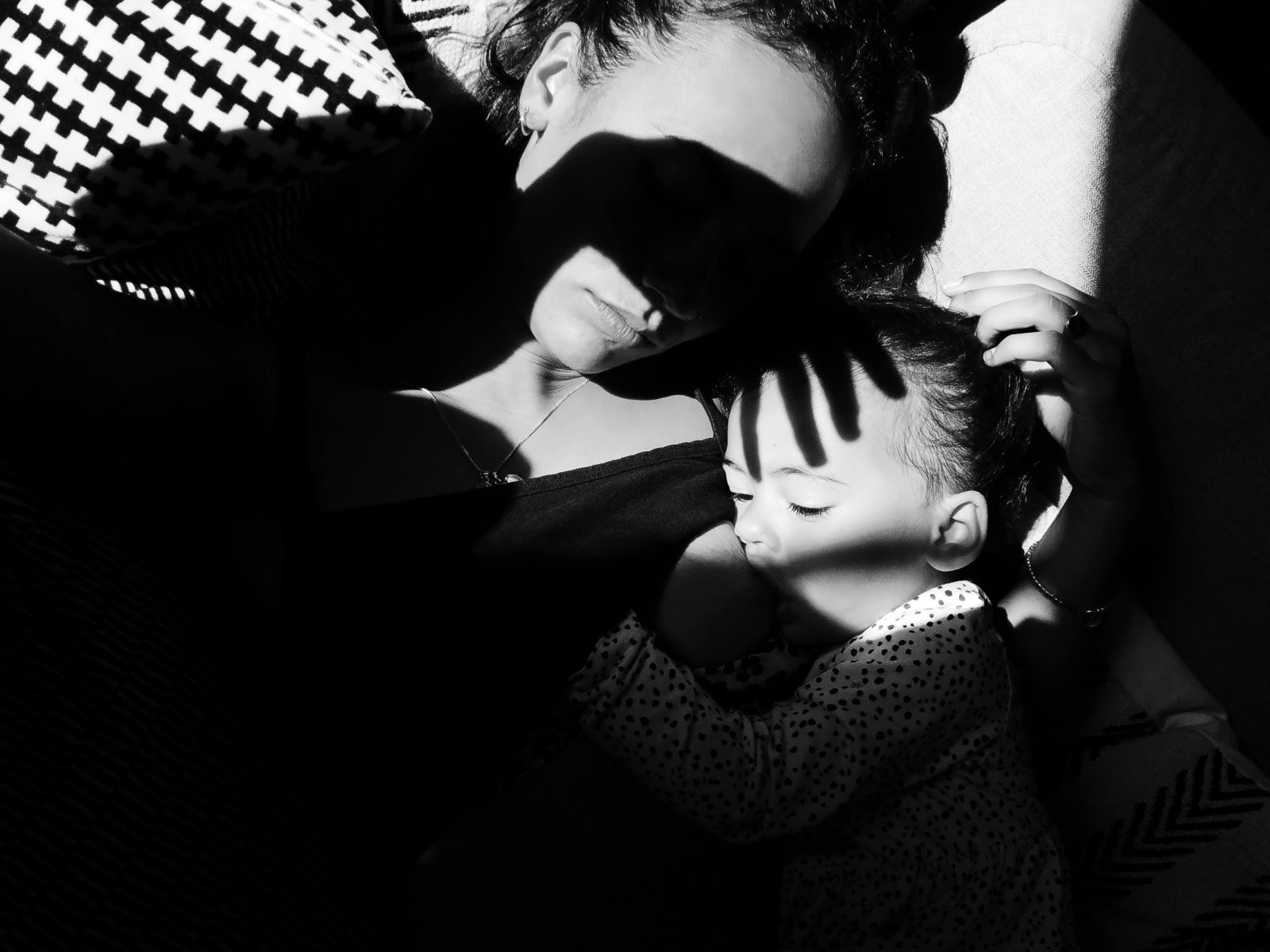From issue: #15 Hope and Futurity
Image by Asia Werbel
Text by Clorinde Peters
In the bath the other day, my older son suddenly said, I see firetrucks.
Where? I asked.
Here, he said, touching his fingertips to his closed eyelids.
My breath caught in my throat. I knew I was witnessing one of those magical moments where some greater truth falls into place for your child: that we can picture, imagine, and conjure other worlds—people, memories, even firetrucks.
Photography conjures these other worlds too, even as it illuminates and tells us about this one. I often turn to images to help me to parse what I am feeling and to understand if others feel the same way. These days I am hungry for images of mothering—of the monotony and wonder and pain of it all. My older son is not yet three and my younger is not yet one. Sometimes I wonder how I will explain the pandemic and the sum of these last two dystopian years, assuming it ends before it becomes part of their permanent memory. The usual worries of parenting have been compounded by Covid and by the realities of raising still-unvaccinated children, and my partner and I have shouldered these burdens alone. It is an unsustainable position for parenting that we—and so many others—find ourselves in, out of necessity for the safety of our children. Parents have come to expect the exhausting work of seemingly endless risk analysis, the need to improvise amid lapses in childcare, and the serial blows to our careers. I especially think about how the pandemic has forced millions of women out of the workforce (participation has been set back forty years by some estimates), revealing again the persistent and entrenched inequalities of care work. With my kids in tow, I lock eyes with other mothers on the street in a kind of solidarity I hadn’t known before.
Bearing the weight of care work without adequate support is not a new problem under capitalism—it is either underpaid or excluded from our economic system altogether—but many parents feel this burden more acutely than ever before. Much of this work is largely invisible, and as a result, it can be deeply lonely. As I mother my children, I desire a different kind of care—a community of care, an ethic of care, the elusive village—and I imagine that there are many of us, each tucked under our own sheets with our own children, dreaming of and wishing for each other. Motherhood remains one of society’s primary repositories for our deepest anxieties and most fervent hopes. So much of it is either stereotyped or fetishized, and I am simultaneously weary of narratives about mothers and desperate for new ones. I look for photographs that pierce our solitude and invite us into a kind of mutual future—a future ripe with the possibilities of what else can exist in the midst of motherhood. I desire images that show motherhood underpinned by a sustainable model of care work, while also depicting it as more than care work.
Asia Werbel’s series Mother, which centers on her daughter and granddaughters, embodies this other configuration of care. Werbel began taking Polaroids when she was a single mother at twenty-five, home alone with her infant daughter. Twenty-some years later she has constructed—both in her family and in her photographs—a community model of care and mothering that she builds with her daughter, her daughter’s two daughters, and her own mother: four generations of women. These photographs live somewhere between documentary, portraiture, and family album; they are more habit and ritual than a discrete body of work.
In Werbel’s photograph Daughter (2020), I find hope in the way that these two bodies nestle into one another, how even as the mother shields her own eyes from the sun, her shadow caresses her daughter’s head as she nurses. This is a feeling I have become so familiar with: the surrender to comfort or fatigue that I feel in my own children every day. I find hope there because of the possibility that there are bodies beyond my own that can catch and hold my children, a wider community of care that makes life as a parent possible. I want to believe in an image of motherhood not predetermined by patriarchy, racism, the career cliff, and saccharine notions of “leaning in,” whereby not “having it all” is chalked up to personal failure and timidity rather than to the structural conditions that make it nearly impossible.
Werbel’s photographs from Mother do not belie the intertwined disappointments of childhood and parenthood, but instead demonstrate the solidarity and tenderness that make them bearable—even wonderful. Her photographs interrupt the often predictable and steady stream of images of motherhood, offering something more honest (none of the Madonna and Child images that I don’t recognise in my own life, but the ones that I do: a belly soft and newly empty, a toddler clinging to their mother while she nurses a new sibling, soap suds dripping off a chin, chipped nails, errant curls). The sum of these photographs gives those of us walking the loop of parenthood—repetitions of anxiety, loneliness, joy, growth, and hope—the reassurance that we are neither forgotten nor forgettable.
It is not just the image to which I am drawn, but the conditions of its making. Scattered amid her documentary and fashion photography, Werbel’s family images don’t feel out of place on her Instagram grid—maybe because she brings her professional aesthetic rigor to her work on her family, or because she brings the tenderness and intimacy to her professional portfolio. The relationship between the two and the way they bleed into each other visually provides a lesson in being both visible as a mother and a person independent of motherhood. Werbel’s photographs reflect the possibility of a motherhood that doesn’t cast my other identities and loves at odds with parenting (I know that in their most capacious moments my identities are teachers for each other—I know this, but the message is that we must choose).
In Daughter, I see a model of motherhood where we don’t have to pretend we aren’t parents in order for our work to be seen as rigorous. The photograph’s formal elements—strong contrast, linear abstraction, and the preoccupation with light and shadow—reference constructivist and modernist photographers like Aleksandr Rodchenko or Bauhaus artist László Moholy-Nagy, who championed photography as an aesthetic tool with which to reimagine and reconstruct society. Werbel’s photography possesses this aesthetic intelligence that suggests we can make work that is beyond us and our children even as it is about them; the photograph of Werbel’s daughter and granddaughter nursing is also a narrative about Werbel as a photographer, an artist, and a mother at once. It is a photograph of something and it is a photograph that does something: it performs a kind of reparative work to rebuild our relationship to the social world.
In the moments when care work feels prescribed, a photograph like this provides an opening through which we can together imagine a different everyday. It reminds me that the care I long for is not an ideal that exists elsewhere or nowhere, but something that is made possible here. I feel hope in this gentle everyday—even amid a string of everydays—honoring these small rituals that we engage in with our children, and how they teach us wordlessness, repetition, enduring patience. Children make strange to us what we accept as inevitable, reminding us that we can choose differently. Photography also helps us to question what exists; it offers a vision of what is and simultaneously of what might be. There is hope in this duality, just as the photographs in Mother reflect a more expansive and joyful present in order to manifest the vision of a better future. These images feel honest in their depiction of motherhood and create a world that transcends where we are now: they live in the everyday, here, but are utopic by virtue of their making, expanding our understanding of what mothers are.
As I lay my children into their beds at night, I whisper in their ears, sogni d’oro, something my grandmother used to say to me. It is one small way that I conjure her to be here with my sons, in the community of care I am trying to build for us. May we all dare to have dreams of gold, to hope for better, and to make them together, in this place.
Find out more about Asia Werbel here.
For more on Clorinde Peters, click here.


